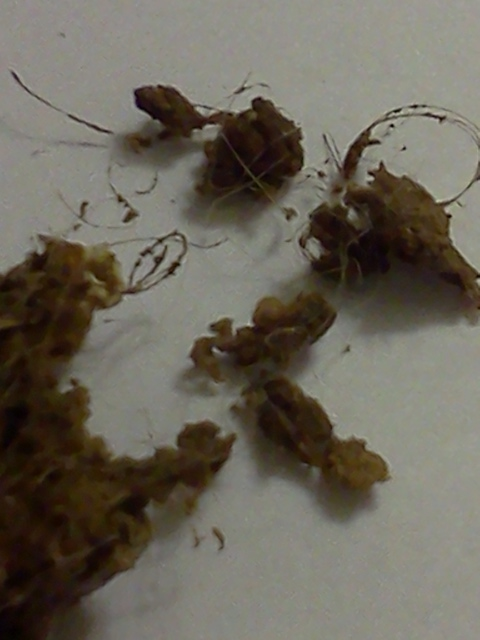QuestionHi Patti: A few years ago you replied to a person who had a question about her Boxer with Colitis and you suggested a little pumpkin in her food.
I am contemplating a Boxer rescue but they say she has Colitis and needs a B-12 shot every month. Have you ever heard of this treatment?
I have looked all over and can not find where that is a treatment for Colitis.
Thanks,
Larry
Answer
Hi Larry,
In dogs the condition is called Inflammatory Bowel Disease (IBD) (or Inflammatory Bowel Syndrome when it's less serious). There's lots of info on this condition online, here's a couple of sites to get you started:
http://www.akcchf.org/canine-health/your-dogs-health/disease-information/inflamm
http://www.peteducation.com/article.cfm?c=2+2090&aid=305
http://www.happyhealthydogblog.com/the-role-of-vitamin-b12-in-treatment-of-ibd/
If B-12 shots are currently being administered and it's controlling the condition, then you should continue the injections. It's a lot simpler to continue with something that works, than searching (possibly unsuccessfully) for something that works as well. In time with your vet's guidance you can always try different things that may control the condition. But having owned a dog that had IBD, I know that once you find something that works, it behoves you to stay the course.
Because it's a chronic condition that can vary in it's symptoms between dogs, there isn't one single treatment for Colitis/ Inflammatory Bowel Disease. Severity of the condition can also vary from dog to dog. A little pumpkin can be helpful. Pumpkin helps by absorbing the liquid in the system and adds fiber to help firm the stool. Using psyllium fiber (such as Metamucil) works in the same way. Soluble fiber found in psyllium fiber can help relieve both constipation and diarrhea, and is used to treat irritable bowel syndrome and other intestinal problems. Omega 3 Fatty acids can help decrease intestinal inflammation.
Using a probiotic could be helpful. Bacillus coagulans (formerly called Lactobacillus sporogenes), and Enterococcus faecium, Lactobacillus acidophilus, Bifidobacterium infantis, Lactobacillus bulgaricus, and Bifidobacterium longum are all common stains in supplements. There are several probiotic supplements made especially for dogs, but using one made for humans will be cheaper and may have more in the way of quality control. Look for a supplement that has of live bacteria in the billions.
Some dogs with IBD have improvement with high fiber diets. Others do better when fiber is reduced. In addition, some dogs have less diarrhea when the fat content in their diet is reduced. It could take a while to discover what kind of diet this particular dog does best with. Depending on how bad the condition is, the dog might do better on a hypoallergenic diet that's free of preservatives, additives and artificial colors, and uses a "novel" protein source such as rabbit, venison, duck, or fish. Table scraps would be a huge no-no. I can offer suggestions for a diet, if you'd like to get back to me.
It wouldn't surprise me if a combo of diet, supplements and possibly medication may be needed.
In dogs, a condition called Addison's disease can mimic chronic intestinal disease, among numerous other possible manifestations. This condition, more correctly termed hypoadrenocorticism, is often referred to as "the Great Imitator" as it can mimic many other diseases besides Inflammatory Bowel Disease. This condition revolves around a deficiency in cortisol, a crucial hormone in adaptation to stress. Treatment is relatively straightforward so it is important not to forget to screen for this condition.
In my case, my dog that had Inflammatory Bowel disease, his condition was controlled by a homemade diet, psyllium fiber, and daily low dose of Metronidazol (Flagyl) with Reglan on an "as needed" basis. Occasionally Prednisone was also needed. I adopted my dog (Sammy) when he was approx. 8 years old from a rescue group, and he lived to at least 20 years old! In the end a progressive degenerative nerve condition is what did him in.
I hope I've been a help!
Feel free to get back to me if I can be of further help.
Patti

 old age dog
Question
he was barking!
I have a Dog who is a german s
old age dog
Question
he was barking!
I have a Dog who is a german s
 new puppy
Question
bella
I adopted a puppy from the humane
new puppy
Question
bella
I adopted a puppy from the humane
 Dog Worms
QuestionDog Poo
Dog Poo
QUESTION: Ive got
Dog Worms
QuestionDog Poo
Dog Poo
QUESTION: Ive got
 doggie doldrums
Questionsad dog
QUESTION: I have a 2 year old go
doggie doldrums
Questionsad dog
QUESTION: I have a 2 year old go
 my 3 year old welsh corgi
Question
Bella
I have 2 old cairn terriers, 12 and 15 (
my 3 year old welsh corgi
Question
Bella
I have 2 old cairn terriers, 12 and 15 (